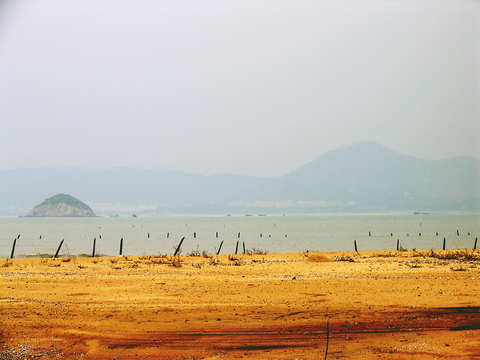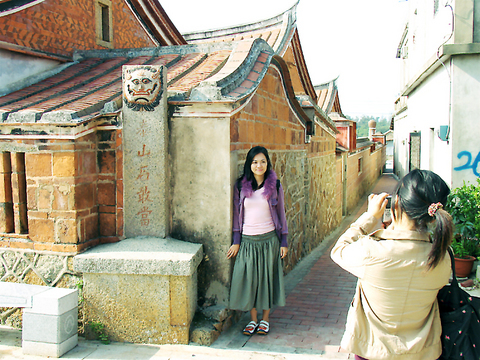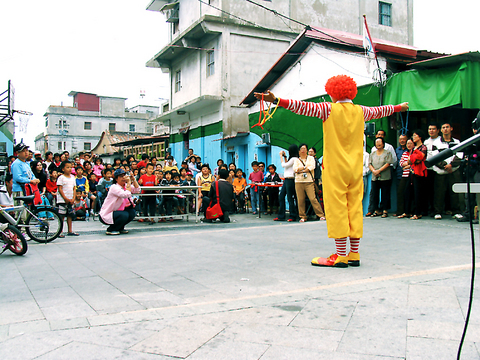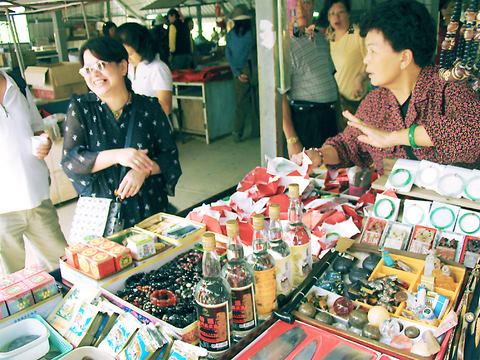The great-crested grebes are flocking to Kinmen. Rarely seen in other parts of Taiwan, they fly to the nation's westernmost archipelago from central and northern China to enjoy the islands' drier, more temperate winter climate. Together with great cormorants and lesser-pied kingfishers, they come in the thousands.
While the residents of Kinmen are happy to host their yearly visitors, they've lately been pining to be paid a visit by a different species of guest from China: the tourist.
Unfortunately, the windfall of Chinese visitors originally expected from the opening of postal, transport and travel links with China's Fujian province has failed to materialize.

PHOTO: DAVID MOMPHARD, TAIPEI TIMES
Politicians point to problems in policy that have hobbled the development of the island's tourism industry, but local business leaders say economic factors are also to blame.
Although Taiwan opened its doors to visitors from the mainland via the "three small links" in January 2001, the government in Beijing did not allow its citizens to take advantage of the travel links until September last year, when Fujian Province Deputy Governor Wang Meixiang (
Previously, only politicians and businessmen were allowed to travel to Taiwan's Kinmen and Matsu islands to facilitate the part of the three links China was taking full advantage of, the transport of Chinese goods to the islands.

PHOTO: DAVID MOMPHARD, TAIPEI TIMES
Over 15,000 port calls have been made in Kinmen and Matsu since 2001, with 55 percent being Chinese cargo ships. Of the 2.3 million tonnes of products handled at Kinmen's Shuitou Port since 2001, 2.2 million were imports from China.
The remaining 1 percent was mostly Kinmen's famous Kaoliang liquor being shipped to the Chinese ports of Mawei and Xiamen, the latter of which is a mere 2km from Kinmen.
Of the 951,000 passengers who have made the journey between the two nations, 94 percent were China-bound Taiwanese. Residents of Kinmen and Matzu have bought some 4,000 houses in Xiamen and spent nearly NT$3 billion.

PHOTO: DAVID MOMPHARD, TAIPEI TIMES
"The opening of these transportation and travel links were supposed to be a boon for our businesses," said Kinmen County Commissioner Lee Chu-feng
"A year ago our township heads were clamoring to attract hotel and resort developers. When the first group of mainland tourists came in December of last year we met them at the airport with banners and flowers. And since then, only 2,000 have come. There were 10 million people from all parts of China that visited Xiamen last year and only 2,000 of them made the half-hour boat ride to Kinmen."
Instead, Lee and others said, the three small links have been a boon for Taiwanese businessmen who operate in China. Since 2001, Kinmen's population has grown from 50,000 to 60,000. The influx is due to Taiwanese businessmen who have switched their household registrations from Taiwan proper to Kinmen in order to take advantage of travel links.

PHOTO: DAVID MOMPHARD, TAIPEI TIMES
An alternative route
After having been registered for six months, new residents can apply for a permit that allows them to board boats bound for Fujian Province. On the other side, they are issued five-year permits allowing them to board boats to return to Kinmen, where they can fly inexpensively to their actual homes on Taiwan proper.
"With my factory located in Fujian, it's cheaper for me to travel via Xiamen and Kinmen than to have to go through Hong Kong," said Wu Ching-chung (
Locals complain that these taishang (
"They get off the plane at the airport and take a bus to Shuitou Harbor and they're gone," said one local restaurant owner. "They don't stop for a meal because they're afraid of getting sea sick. And when they come back through they don't eat because they've got a plane to catch!"
Kinmen County Legislator Wu Cheng-tian (
"The airlines that operate flights to Kinmen used to offer discounts to attract more tourists," he said. "Now all the flights are taken up by taishang and the airlines don't feel a need to offer discounts. As a result, there are fewer actual tourists coming."
Kinmen's two main islands have enjoyed a steady stream of visitors from Taiwan since martial law ended in 1992. A more recent demilitarization has brought an even larger influx of tourists wanting to crawl into abandoned bunkers, traipse through the several kilometers of tunnels burrowed into the island and gawk at the giant megaphones once used to broadcast propaganda to China.
Huge swaths of land remain mined, but the government is working to clear these to make way for development.
The problem is that the ferries returning to Kinmen from Fujian were supposed to be filled with China tourists, themselves curious to get a closer look at the island on which, in 1958, they'd dropped half a million bombs.
When the Taiwanese government capped the number of visitors at 600 per day (each was allowed to stay a maximum of three days and two nights) Kinmen officials protested. Though the cap remains it has come to naught; the number of Chinese visiting the island in a single day has yet to come close to that number, according to Lee and local tourism officials.
The reason is two-fold: an added layer of red tape on the Chinese side and an economic disincentive. For residents of Fujian to come to Kinmen or Matsu, they need to start their application procedure seven to 10 days in advance, provide all the pertinent paperwork, and often return to the application office more than once. There are too many hoops to jump through for the causal visitor.
What's more, tour packages are priced at around NT$3,500 for three days and two nights, about the same as the average monthly salary for residents of Fuzhou, the seat of Fujian province. For those who can afford it, a trip to Hong Kong costs about the same, but involves far less hassle.
The tour packages are what's known as zero-dollar tours, meaning the travel agencies booking tours don't make money off the package itself, but earn a commission from sales at the various places they take the tour groups; restaurants and the several novelty boutiques unique to Kinmen. But even here, according to local tourism officials, there is little money to be made.
"If you're [in Kinmen] long enough, you discover that everything has three prices: one for locals, one for guests from Taiwan and one for guests from China," said chief of the Kinmen County Culture Affairs Bureau, Lee Hsi-rong (
Betting on the future
One potential fix to the problem favored by a majority of residents is gambling. In May of this year, Premier Frank Hsieh
"The people of Kinmen are literally stuck in the middle," Lee said, adding that he wishes the island could have a greater say in its own future beyond what the government allows.
But not everyone is unhappy with the current situation and these people say living standards have improved drastically since the days when Kinmen was a fortified bunker and the closest target for aggression from China.
"All you hear about is how businessmen in Kinmen can't make money," said a life-long resident who gave his name as Huang. "But life here is better than it has ever been and they're still richer than businessmen in Fujian."
He mentioned the birds that every year fly from China to Kinmen's wetlands and the fact that this, as last year, they bring with them the specter of avian flu. "If a disease like that came to Kinmen it would ruin us economically if it didn't kill us. People think that if weren't for politics we could be a lot closer to China, but I think there is more than one reason to keep our distance."

That US assistance was a model for Taiwan’s spectacular development success was early recognized by policymakers and analysts. In a report to the US Congress for the fiscal year 1962, former President John F. Kennedy noted Taiwan’s “rapid economic growth,” was “producing a substantial net gain in living.” Kennedy had a stake in Taiwan’s achievements and the US’ official development assistance (ODA) in general: In September 1961, his entreaty to make the 1960s a “decade of development,” and an accompanying proposal for dedicated legislation to this end, had been formalized by congressional passage of the Foreign Assistance Act. Two

March 31 to April 6 On May 13, 1950, National Taiwan University Hospital otolaryngologist Su You-peng (蘇友鵬) was summoned to the director’s office. He thought someone had complained about him practicing the violin at night, but when he entered the room, he knew something was terribly wrong. He saw several burly men who appeared to be government secret agents, and three other resident doctors: internist Hsu Chiang (許強), dermatologist Hu Pao-chen (胡寶珍) and ophthalmologist Hu Hsin-lin (胡鑫麟). They were handcuffed, herded onto two jeeps and taken to the Secrecy Bureau (保密局) for questioning. Su was still in his doctor’s robes at

Last week the Democratic Progressive Party (DPP) said that the budget cuts voted for by the China-aligned parties in the legislature, are intended to force the DPP to hike electricity rates. The public would then blame it for the rate hike. It’s fairly clear that the first part of that is correct. Slashing the budget of state-run Taiwan Power Co (Taipower, 台電) is a move intended to cause discontent with the DPP when electricity rates go up. Taipower’s debt, NT$422.9 billion (US$12.78 billion), is one of the numerous permanent crises created by the nation’s construction-industrial state and the developmentalist mentality it

Experts say that the devastating earthquake in Myanmar on Friday was likely the strongest to hit the country in decades, with disaster modeling suggesting thousands could be dead. Automatic assessments from the US Geological Survey (USGS) said the shallow 7.7-magnitude quake northwest of the central Myanmar city of Sagaing triggered a red alert for shaking-related fatalities and economic losses. “High casualties and extensive damage are probable and the disaster is likely widespread,” it said, locating the epicentre near the central Myanmar city of Mandalay, home to more than a million people. Myanmar’s ruling junta said on Saturday morning that the number killed had